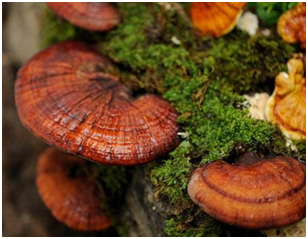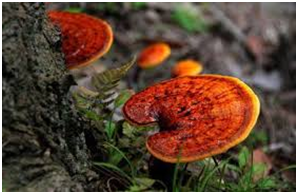At present farmers farm land, heavy chemical fertilizers, light agricultural fertilizers, diazo-phosphate fertilizers, light potassium fertilizers and trace fertilizers, resulting in decreased soil fertility and nutrient imbalances. This is the root cause of the deficiency of corn.
Reishi
Mushroom
Reishi Mushroom, also known as Ganoderma or
Lingzhi, is a polypore mushroom that grows on wood in dark and moist
environment. It usually consist of a rounded and soft mushroom cap and a long
stem. The Ganoderma genus includes about 80 species. Among them, Ganoderma
Lucidum, or red Reishi, is the most studied and used species.
Ganoderma and its extensive use has been
documented in many traditional Chinese medical literature for more than a
thousand years due to the health benefits it has. In ancient China, because
wild Ganoderma was very difficult to find, it was only served to the emperors. Therefore,
it was also called [The Magic Herb". Nowadays, thanks to the development of
modern cultivation and processing techniques, Ganoderma has become more available
and more affordable to people. Many scientific researches have also been done
on the potential health benefits of Reishi Mushroom.
Studies have shown that Reishi Mushroom has
multiple health benefits. It is effective in enhancing overall immunity,
protecting the liver, and improving sleep quality. The main two active
compounds are called Ganoderma polysaccharides and triterpenes. Ganoderma
polysaccharides can activate human`s immune system, increasing the activity and
number of immune cells. Triterpenes, on the other hand, can fight directly
against pathogens and abnormal cells such as tumor cells. Therefore, Reishi
Mushrooms is also good for assisting cancer treatment.
Most people may think that wild Reishi
Mushrooms are better than cultivated ones while in fact that is not the case. Since
Reishi Mushrooms are a type of fungi, they acquire their food by absorbing
dissolved molecules. Therefore, they are very likely to absorb pollutants into
their tissues, including heavy metals such as mercury. That is also why many
countries use mushrooms to clean up waterways and soil. However, since it is impossible
to control and screen the source of every mushroom we collect, wild Reishi
Mushrooms are very likely to have contaminants inside. Also, Reishi Mushrooms
use their spores to spread and reproduce. As it reaches maturation phase, the
spores will shoot out from tiny tubes underneath the cap. The spore powder is
also where most of the nutrients of Reishi Mushroom are stored. In the wild, we
cannot keep monitoring every growth stage of Reishi Mushroom, so most of the
time the Reishi Mushrooms we collect do not have much spores left, which means
they have much less nutritious value. Besides, there are other factors that may
affect the quality of Reishi Mushrooms such as sunlight, humidity, parasites
etc. GANOHERB on the other hand, has been focusing on growing Reishi Mushroom
for 29 years. It has multiple self-built Ganoderma farms and therefore is able
to control and monitor every step that may affect the quality of Reishi
Mushroom, delivering the Reishi Mushroom with highest quality and safety. We
strictly controls every single step of the cultivation process to ensure each
step is ideal for the growth of Reishi Mushroom. GanoHerb has acquired 4
organic certifications from the EU, the US, Japan, and China. Our goal is to
let the world share the traditional Chinese treasure.
Reishi Mushroom Reishi Mushroom,Raw Reishi Mushroom,Organic Reishi Mushroom,Reishi Mushroom Powder Ganoherb International Inc , http://www.ganoherb.com
The deficiency of corn is mainly divided into two kinds: zinc deficiency and potassium deficiency. In the absence of zinc in maize, the veins on the upper leaves of the plant showed stripe-like chlorosis on both sides, white leaves, shortened internodes, and short plants. In severe cases, the entire leaf is dry and the plants die. In the absence of potassium in maize, the upper leaves of the plant are chlorotic from the tips of the leaves, and then the bases and edges of the leaves expand and turn yellow-brown. In severe conditions, the leaves stand upright and the plants die.
The main methods for controlling the deficiency of corn are:
1 Increase the use of farmyard fertilizers to fundamentally solve the problem of incomplete supply of nutrients. Fertilizer has long-term fertilizer effect and nutrients, improving soil and promoting soil nutrient release.
2 Applying zinc fertilizer and potassium fertilizer at the time of sowing can effectively prevent the occurrence of deficiency syndrome and increase the production. Generally, 1 kg of zinc sulfate and 5 kg of potassium sulfate can be used per mu.
3 Once a deficiency is found, a 0.2% solution of potassium sulfate (or zinc sulfate) and 0.03% of rare earth fertilizer should be sprayed immediately, spraying all over the field to remedy the situation, and normal conditions can be restored.

